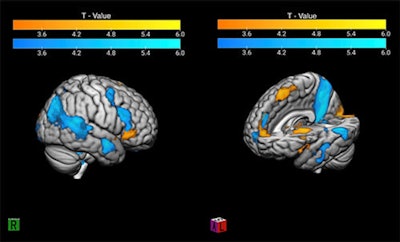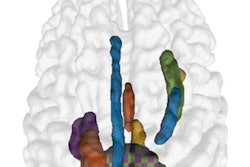Functional MRI shows brain activity sparked by fanaticism, according to a presentation to be delivered at the upcoming RSNA meeting.
A group led by Francisco Zamorano Mendieta, PhD, of the Universidad San Sebastián in Santiago, Chile, found that soccer fans show brain activation patterns while watching a match that trigger either positive or negative emotions and behaviors – a result the group hopes will illuminate the workings of "fanaticism" in the brain in other arenas.
"Fanaticism is extreme or excessive devotion or enthusiasm towards a particular cause, belief, or opinion," the investigators wrote. "It often involves blind and unquestioning loyalty to a particular ideology or leader, and a refusal to consider other perspectives or opinions. Fanaticism can lead to intolerance, aggression, and even violence toward those who do not share the same beliefs or views. In this sense, our study proposes a new model for studying complex behaviors like fanatism."
Soccer fans – particularly those in Europe and South America – are known for their team loyalty and enthusiasm and can be "very protective of their 'home' team and favorite players," Mendieta and colleagues noted. The investigators sought to examine the brain mechanisms that lead to fans' behavior, conducting a study that included 43 healthy men who support the two most popular Chilean soccer teams, which are considered archrivals; the men were divided into two groups, one group of 22 individuals and another of 21.
All underwent a functional MRI (fMRI) exam while being presented with a video compilation of matches (total goals in all matches, 63).
 The contrast of winning and losing in the "good fanatic brain." The image shows in warm colors the activity related to a significant victory. The blue scale represents the activation related to a significant loss; this pattern is congruent with the Mentalization Network, which suggests a rationalization process of the pain evoked by the losing scenario. Image and caption courtesy of the RSNA.
The contrast of winning and losing in the "good fanatic brain." The image shows in warm colors the activity related to a significant victory. The blue scale represents the activation related to a significant loss; this pattern is congruent with the Mentalization Network, which suggests a rationalization process of the pain evoked by the losing scenario. Image and caption courtesy of the RSNA.
The fMRI exams showed that the men's brain activity changed when their favored team succeeded or failed.
"When their team wins, the reward system in the brain is activated," Zamorano said. "When they lose, the mentalization network can be activated, taking the fan to an introspective state. This may mitigate some of the pain of the loss. We also observed inhibition of the brain hub that connects the limbic system with frontal cortices, hampering the mechanism that regulates cognitive control and increasing the probability to fall into disruptive or violent behavior."
The researchers hope that the study findings may offer insight into social dynamics in other areas, although this could be tricky, as "arenas like political stances, electoral loyalties, ethnicity, spirituality, and identity issues are frequently mired in controversy, complicating efforts to pinpoint the neurological foundations of extreme allegiance," they wrote.
"People inherently crave social connections, be it through membership in a running club, participation in a book discussion group, or engagement in virtual forums," Zamorano said. "While these social bonds often form around shared beliefs, values and interests, there can also be an element of persuasive proselytism, or 'group think,' which may give rise to unreasoned beliefs and societal discord."



















